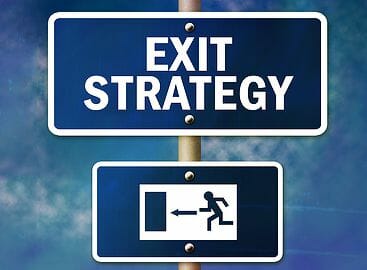Hello!
Recently, a group of successful young entrepreneurs was interviewed to find out what they consider to be mistakes that many entrepreneurs make when they sell their business.
 If you are planning on making an exit from the business you’ve worked so hard to build, you’ll want to take a look at some of the advice given by these entrepreneurs.
If you are planning on making an exit from the business you’ve worked so hard to build, you’ll want to take a look at some of the advice given by these entrepreneurs.
Knowing about them can help you avoid them before you start the process of selling your business.
Here are 14 mistakes they’ve identified and how you can avoid making them yourself.
Mistake #1 - Trying to Make a Quick Exit
 It’s easy to get excited about the possibility of making an exit from your business and then try to force the process to happen sooner or faster than it really should. Planning your business exit is important and you shouldn't rush it.
It’s easy to get excited about the possibility of making an exit from your business and then try to force the process to happen sooner or faster than it really should. Planning your business exit is important and you shouldn't rush it.
Think about Facebook, as an example. If Zuckerberg had taken the first offer that was sent his way, Facebook quite possibly may not have become the goliath it is today. If he would have rushed to make an exit, billions of daily users may have never come to fruition.
Instead of trying to get out as quickly as possible, take a long-term view what it takes to keep your business growing.
Mistake #2 - Not Understanding Cash vs Earnouts
There’s usually going to be two different scenarios after a buyer has purchased your business.
They are going to require you to give them assistance as they’re transitioning into taking over the business and this could dictate how they’re willing to pay you to buy it.
The first scenario is where they pay the entirety in cash, up front. The second is considered an earnout and structures payments based on the performance of the business.
 The first scenario is where you’re going to want to focus if you’re trying to get out of the business quickly.
The first scenario is where you’re going to want to focus if you’re trying to get out of the business quickly.
The second scenario creates situations that are out of your control because the remainder of what the new investor owes is due when the business has hit certain performance goals they have set out to achieve.
That means you’re going to be on the hook to make sure those goals are hit and the new owner could be completely rubbish at running the business. This would mean you would have to keep it floating in order to receive the rest of your money.
In general, earnouts are bad for you as a seller and getting cash up front is the only way to guarantee you’re getting the entire payout. You can offer assistance after the sale, but don’t let your money be tied to outcomes the buyer has control over.
Mistake #3 - Giving Up the Wrong Type of Shares
When you were first building the business, you may have given certain types of shares to your investors, employees, advisers and other people that were critical in your business to where it is today.
Depending on the type of shares you’ve given out, you could be hindering your ability to actually make an exit because of so many loose ends with your shareholders.
To avoid screwing yourself out of being able to make an exit, you’ll want to avoid giving out too many shares and bringing in too many outside parties that are going to end up being a part of the exit when it finally happens. This is one of the main reasons why you want to be planning your business exit.
Mistake #4 - Letting Others Pressure You into Bad Decisions
 Investors that you’ve taken on while you were growing the business are going to play a large role when it comes time for you to sell the business off.
Investors that you’ve taken on while you were growing the business are going to play a large role when it comes time for you to sell the business off.
You could be making a mistake by placing too much weight on their opinions, especially when it comes to cashing out when you feel the time is right.
Other times, those same investors will be pressuring you to sell off the business before you have hit the goals that you’ve set for the growth of the business. They’re more concerned with a fast return on their investment instead of a larger potential upside down the road.
If you have investors that aren’t wanting to wait, you may want to consider buying them out so you can focus on selling the business when you decide the time is right without so many others being involved.
Mistake #5 - Accepting Your First Offer
Generally, the first offer that lands on your desk isn’t going to be the best offer you can get.
 It’s easy for you to get excited about having an offer without thinking about the potential for other investors to make larger offers or share the same vision you had in terms of growing the business.
It’s easy for you to get excited about having an offer without thinking about the potential for other investors to make larger offers or share the same vision you had in terms of growing the business.
Most times, waiting and seeing what other offers come in can actually drive up competition between investors, giving you a much higher return when you finally sell.
Waiting for other offers also gives you additional time to weigh the offers you’ve already been given, so you know you’re making the right decision when you’re ready to close.
Mistake #6 - Seeing the Face Value
When it comes to selling your business, there’s more you need to consider than simply the number of commas on the check your investor is signing over.
The investor you choose to sell the business to is going to have full control over what you’ve built: your products, your marketing, your customers and your brand.
Chances are high that you’re going to have to work with them for a while after the sale. Because of this, you’re going to want to avoid selling simply because you want to make some money.
Think about your mission for the business and the goals that you put into place as you were building it. Make sure that the money you’re about to receive will be worth seeing the business you’ve built placed in someone else’s hands. Planning your business exit well will let you prevent this.
Ask yourself if the buyer you’ve chosen to sell to has the same goals and vision you had. Can they improve upon it, or will your initial dream become a reality instead of a nightmare?
Mistake #7 - Not Understanding What Value Actually Means
 Many entrepreneurs devote a ton of time and energy into building their companies in ways that, in the end, add zero value to their actual business.
Many entrepreneurs devote a ton of time and energy into building their companies in ways that, in the end, add zero value to their actual business.
When you’re planning on making an exit, think about four key principles: reducing risks, demonstrating growth, having accurate records and making it easy to transfer the business to your buyer.
Optimizing each of these aspects will make your offer far more attractive to investors, while also ensuring that you are building the business with long-term goals in mind.
Mistake #8 - Focusing on Making an Exit Before You’ve Begun
Sure, building your business with the idea of making an exit one day is a smart move.
 However, planning your business exit too early and building your business around that exit can potentially harm your ability to grow, at least in any sustainable kind of way.
However, planning your business exit too early and building your business around that exit can potentially harm your ability to grow, at least in any sustainable kind of way.
For instance, some entrepreneurs take shortcuts or only set goals that lead up to the day they’re cashing out of the business.
Instead of focusing your goals around getting you to the point of selling, create long-term goals for the company that focuses on its growth even after you’re no longer in the picture.
This will help you avoid some of the sloppy mistakes and missteps that lead to building a foundation of sand and smaller offers from buyers.
Mistake #9 - Not Working with a Broker
 The key to getting maximum value from the sale of your business is having more than one investor interested in buying the business from you.
The key to getting maximum value from the sale of your business is having more than one investor interested in buying the business from you.
Having multiple offers from qualified investors can be difficult if you’re trying to sell the business by yourself.
Working with a broker can get your offer in front of a list of buyers that are ready to purchase. Brokers can also help you dissect your business to ensure you have made the business as attractive to investors as you can.
A reputable broker can also help you during the negotiation process, so you get the highest price possible.
Mistake #10 - Valuing Your Business Too High
It’s easy to understand why you would want to view your business as one of the most valuable assets currently in existence.
However, the value that you’ll place on your business and the value that buyers are willing to pay for the business are often in two completely different worlds.
You’re going to end up putting a value on the amount of time, energy, blood, sweat and tears you’ve devoted toward growing the business. Meanwhile, your buyers are going to be looking at how you’ve structured the business, it’s future potential and how much revenue it generates.
Because of this, you’ll want to look at all aspects of your business objectively. Make sure you understand what investors are going to be looking for and then make sure those areas are optimized to the best of your ability.
Mistake #11 - Not Thinking About Your Lifestyle
When you’re thinking about making an exit and planning your business exit, chances are high that you’re only thinking about how much money you can make from the sale.
Very few entrepreneurs actually take their lifestyle into consideration.
 After all, you started building the business because it was something that you loved to do, but what happens when you have all this extra free time on your hands and a pocket full of cash?
After all, you started building the business because it was something that you loved to do, but what happens when you have all this extra free time on your hands and a pocket full of cash?
What are you going to do, then?
Do you have another project you would like to start? Are you prepared for the loss of the regular stream of income the business was providing you? Will you miss working on the business?
Your lifestyle both before and after the sale is something else you’ll need to consider.
Mistake #12 - Being Afraid to Reach Out to Competitors
Entrepreneurs tend to look at their competition in only one way -- competition.
What if your competitors were one of the best sources you could have when you decide you’re ready to sell off your business?
 If your competitors are relatively the same size or larger than you, you could get even more value from the sale of your business than you would get by selling to an investor.
If your competitors are relatively the same size or larger than you, you could get even more value from the sale of your business than you would get by selling to an investor.
Your competition already knows how profitable the industry can be and they’re likely going to be more than happy to remove you from the marketplace.
Your competitors will want to buy your business either to merge it into their own or to create an additional way to attack the market.
If you do reach out to them, you’ll want to avoid divulging proprietary secrets, at least until you have an offer on the table. Just letting them know that you’re interested in selling can be a great move on your part.
Mistake #13 - Not Thinking Ahead
Regardless how or when you intend to exit from your business, you’re going to end up going through due diligence processes when you’ve got a buyer interested. This is obviously the main benefit of planning your business exit.
During this process, it would be best to have a reputable broker on your side and perhaps even an attorney that has experience, so they can make sure you’re protected.
Knowing how the due diligence process works before you get into it can make the process go far more smoothly. Don’t scramble at the last minute to dot your I’s and cross your T’s.
Mistake #14 - Not Training Key Team Members
 One fatal mistake many entrepreneurs make is building the business around themselves.
One fatal mistake many entrepreneurs make is building the business around themselves.
Instead of hiring key people to help them sustain and grow the business, they’ve taken on every aspect of the business themselves.
This creates a situation where investors will shy away from making an offer because they wanted to gain a revenue-generating asset, not purchase a whole job for themselves.
If you haven’t already, start hiring key people that you can delegate to. Your buyer will thank you for it. Your business is going to be far more attractive when they know that they don’t have to devote large amounts of time toward sustaining the business once they’ve bought it.
Avoid Making These Mistakes Yourself When Planning Your Business Exit
When you started building your business there was a lot going on. You pretty much had to do everything yourself, at least until you were profitable enough to get other people to help you with it.
Even if you have made some of the mistakes listed here, you can still address them, so you can increase the asking price when you decide it’s time to sell.
Also read:
- Gauging if You Need Further Education to Run Your Business
- The Future of Banking-as-a-Service
- Should you take a Decision from the Heart for Your Business’ Improvement?
- Brand Marketing and Performance Marketing in a Nutshell
- 3 Common Hiring Mistakes in Liquidation Businness & How To Avoid Them
Thank you!
Subscribe to our newsletter! Join us on social networks!
See you!






